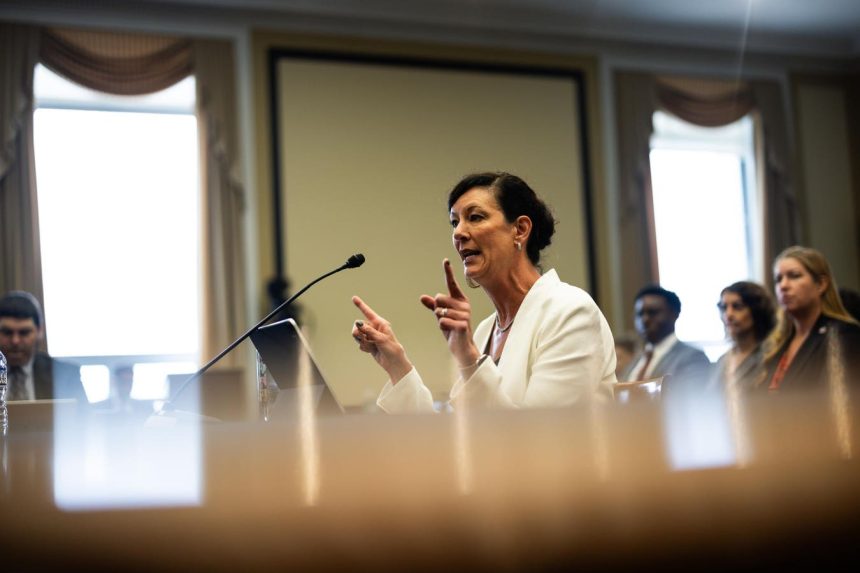Federal Bureau of Prisons (BOP) Director Colette Peters took over the agency in a time of crisis in August 2022. Not only were we still in the midst of the COVID-19 pandemic, but years of neglect had left prison institution infrastructure in need of repair. Staffing shortages, staff corruption and poor morale were all issues Peters had to address on day one. While these challenges remain two years into the job, she has made progress and reflects on her accomplishments and how she intends to steer the BOP in a new direction.
Director Peters sat down for an interview that was put out by the BOP to explain her accomplishments and the many challenges that remain. Peters said of the staffing shortages and the mandatory overtime that is hitting the front lines of correctional workers, “When I talk to our people, what they say is, not only is it exhausting to have to have engage in these mandatory overtime shifts and deal with augmentation. It impacts their family. So not only is it impacting their physical and mental health. What they’re saying to me is we mess up their routine so they have it planned out. Who’s picking up the kids, who’s cooking, what’s the family schedule like? And because of mandatory overtime, we mess that up for the family as well.”
The BOP is an agency in the middle of change. In August 2013, then Attorney General Eric Holder announced changes in sentencing and enforcement that would reduce the federal prison population. At the time, the BOP had nearly 220,000 prisoners and today it is nearly 160,000. Despite that population reduction, healthcare costs, staffing shortages that led to more overtime and costs associated with retaining existing staff have resulted in cost increases for the BOP, the largest budget in the Department of Justice.
Frustrated by the problems plaguing the BOP, congress recently passed on oversight bill that President Biden signed into law last week. The bipartisan legislation requires the Department of Justice’s Inspector General (IG) to conduct comprehensive, risk-based inspections of the BOP’s 122 correctional facilities, provide recommendations to fix problems, and assign each facility a risk score, with higher-risk facilities required to be inspected more often. The IG must also report its findings and recommendations to Congress and the public, and the BOP must respond to all inspection reports within 60 days with a corrective action plan. In the past, the BOP had been less than transparent about its problems and the solutions required to address them.
Whatever the opinion of Director Peters, she has made her own mark on the BOP. While some of the problems she inherited are still there, she has brought fresh ideas to an agency that is shifting focus from incarceration to reentry. Most all prisoners in the federal system will be released back into the community and legislation like the First Step Act provided incentives to allow minimum and low security inmates to spend less time in federal prison. Peters said in an interview, “It’s about ensuring that the individuals, when they get back into our communities, are good neighbors.”
The First Step Act has resulted in thousands of prisoners having their sentences reduced because of incentives offered for participation in programming and productive activities. In addition, prisoners can earn additional time in prerelease custody (home detention), marking a shift in the use of halfway houses for more minimum security prisoners. In the past, halfway houses had been used for all security level of prisoners with more time awarded to those who needed the facilities to get back on their feet. However, halfway house space is at a premium and Peters understands that this is a pressing problem. Peters said, “So this [halfway house capacity] is almost as significant of a problem as our recruitment and retention crisis and our infrastructure crisis, because as you’re aware … now under the First Step Act, they could spend months or years, and so that has created a substantial backlog in our residential reentry center.”
One of Peters’ hallmark initiatives have been listening sessions she has held with staff, union members, formerly incarcerated people and their families. That feedback has been central to her leadership. In addition to the listening sessions, Peters has had several individual meetings with congressional leaders like Senators Dick Durbin, Chuck Grassley and Jon Ossoff, all outspoken critics of the BOP. “It’s one of the best things I get to do as the director, and that is to tell the real story of our corrections professionals,” Peters said who admitted that the overall feeling of the staff at the BOP’s prisons is that they are “exhausted.”
Peters’ battle to win over the BOP staff was made more difficult because she was from outside of the agency. Unlike her predecessor, Michael Carvajal who spent his entire career at the BOP, Peters headed the Oregon Department of Corrections, an agency housing approximately 12,000 adults in 12 state prisons throughout the state. The BOP has over 35,000 employees and 121 institutions across the United States. Peters has visited 50 of those institutions in her two years and plans to visit more.
During a session before the House Judiciary Subcommittee on Crime and Federal Government Surveillance hearing on Oversight of the Federal Bureau of Prisons last month, Director Peters stated that the the BOP needs about 3,000 addition medical positions, a 72% increase from the current level of 3,600 and 3,000 more correctional officers. Overcoming this problem will take more time and money.
Peters said that the BOP is creating a nationwide First Step Act office to help ensure that the BOP is able to consistently respond to questions from Congress, ensure that the spending of those First Step Act dollars are being utilized as effectively and efficiently as possible.
The entire interview with Director Peters can be found here.
Read the full article here
















